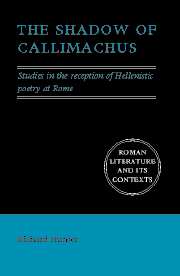3 - Nothing like this before
Published online by Cambridge University Press: 05 June 2012
Summary
The art of the simile
In Plautus' Pseudolus, the crafty slave who gives his name to the play soliloquises as to how he is going to trick his master's old father out of the money which the son needs to buy back his girlfriend. He begins by recognising that he badly needs a plan:
neque parata est gutta certi consili
neque exordiri primum unde occipias habes
neque ad detexundam telam certos terminos.
sed quasi poeta, tabulas quom cepit sibi,
quaerit quod nusquam gentium est, reperit tamen,
facit illud ueri simile quod mendacium est,
nunc ego poeta fiam: uiginti minas,
quae nunc nusquam sunt gentium, inueniam tamen.
You don't have a drop of a fixed plan nor any starting point for your weaving nor any end in view for completing your task to the last thread. But like a poet, when he takes up his tablets, seeks for what is nowhere on earth, and finds it and makes what is a lie to be like truth, so I will now become a poet: I shall find the twenty minae which are now nowhere on earth.
Plautus, Pseudolus 397–405In comparing himself to a poet, Pseudolus exploits a particularly explicit version of a powerful metatheatrical analogy which runs through much of Plautus, namely the analogy between the crafty slave who ‘plots’ the events on stage and the dramatist who creates the ‘plots’.
- Type
- Chapter
- Information
- The Shadow of CallimachusStudies in the Reception of Hellenistic Poetry at Rome, pp. 81 - 114Publisher: Cambridge University PressPrint publication year: 2006
- 1
- Cited by

